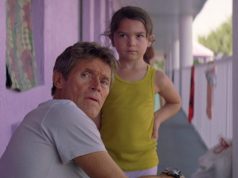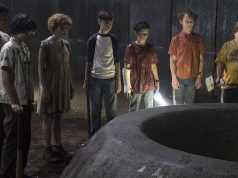The boys in “Hide Your Smiling Faces,” an evocative rumination on adolescence by first-time filmmaker Daniel Patrick Carbone, are in the “exploring” phase of youth. Composed of fragments taken from one typical-but-formative summer, the film shows them roaming the woods, testing their own strength in wrestling matches, investigating an abandoned house, and poking curiously at dead animals. When a gun is introduced, the younger boys stupidly (yet innocently) just want to get a closer look at it.
There are no girls in the picture — probably the last summer that will be the case for the older boys, who at this point only want to laugh, fight, ride their bikes, and break things. Carbone’s snapshots (which feel like memories) are pre-sexual. Two of the kids wonder what it’s like to kiss a girl, but their juvenile experimentation produces giggles, not thrills.
Set in an unspecified pre-cellphone year in an unidentified green, rural part of the United States, the film has two brothers as its central characters: Eric (Nathan Varnson), who’s about 15, and Tommy (Ryan Jones), probably 10 or 11. They’re typical boys, each with a circle of friends his own age, but with school out of session and little in the way of electronic entertainment at hand, they all travel together a lot, too.
A tragedy involving one of Tommy’s friends adds weight to what had previously been a frivolous summer, bringing the boys’ untapped existential angst to the surface. Life, death, and nature — all taken for granted till now — suddenly become relevant. Eric’s friend, Tristan (Thomas Cruz), the beta male of the pack, timidly asks Eric, “Do you ever think about dying? About someone killing you, or you killing yourself?” Eric answers truthfully that he doesn’t — he’s not one for self-reflection — but he’s supportive of his friend’s teenage depression, up to a point.
In keeping with his honest, impressionistic portrayal of youthful summertime memories, Carbone mostly keeps the adults out of it. Eric and Tommy’s parents (Christina Starbuck and Chris Kies) are present and attentive but largely irrelevant. The grieving father of the tragedy kid (Colm O’Leary) is a greater presence because of his conflict with Tommy and Eric over their misbehaving dog, which leads Eric to set a poor example for his little brother. “The way he acts,” their father says to Tommy about Eric. “That’s not you.”
That quietly becomes one of the film’s minor themes, this idea that Tommy is at an impressionable age and his big brother isn’t emotionally mature enough to be a good influence. More broadly, it’s a gentle portrait of the many different ways that young people respond to events in their lives: how our formative years actually form us. Emulating contemplative slice-of-Americana films like David Gordon Green’s “George Washington,” Carbone intersperses the plot-driven scenes with tranquil shots of people at rest, kids playing, water flowing, the lush natural world doing its thing. Even when there’s action, it’s shown with matter-of-fact restraint from a fly-on-the-wall perspective.
There have been several good films in the last year matching the general description of “stories about adolescent boys coming of age in non-urban America,” including “Mud,” “The Kings of Summer,” and “The Way Way Back.” “Hide Your Smiling Faces,” more emotional and overtly artistic than those, and less driven by plot, is a welcome complement to them. The vagueness of the details (we don’t even learn anyone’s last name) reinforces the impression that these kids’ lives are part of the universal experience. None of us can grow up without a little pain sneaking into those languid summer days.
B+ (1 hr., 20 min.; )




